| Srl | Item |
| 1 |
ID:
112073
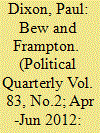

|
|
|
| 2 |
ID:
181048
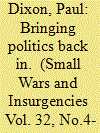

|
|
|
|
|
| Summary/Abstract |
There are contrasting interpretations of the Northern Ireland peace process which have competing implications for the lessons to be drawn from the conflict. This article offers a Constructivist Realist critique of three leading perspectives on the peace process: Neoconservative, Cosmopolitan and Conservative Realists (or Consociationalists). The Neoconservative perspective emphasises the importance of security policy in defeating terrorists before negotiations. By contrast, Cosmopolitans and Conservative Realists emphasise the importance of constitutions and tend to ignore security. Constructivist Realists argue that all three accounts are over-generalised, provide inadequate understandings of politics and, therefore, the relative success of the peace process.
|
|
|
|
|
|
|
|
|
|
|
|
|
|
|
|
| 3 |
ID:
112071
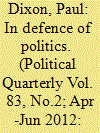

|
|
|
|
|
| Publication |
2012.
|
| Summary/Abstract |
The interpretation of the Northern Ireland peace process is highly controversial because it not only has implications for the future of Northern Ireland but 'lessons' are also drawn for dealing with terrorism and insurgency globally. This article reviews and critiques key interpretations of the peace process. 'The Militarists', Republican Dissidents and Neoconservatives, offer a 'fundamentalist idealist' interpretation which leads them to reject political compromise and continue to pursue victory by military means. 'The Enthusiasts' are leading figures in the Labour government who champion the outcome of the peace process and recommend 'talking to terrorists'. 'The Sceptics' argue in defence of politics and support the pragmatic realism used to negotiate accommodation. They are critical of 'The Militarists' for misinterpreting the peace process and threatening to go back to 'war'. 'Sceptics' welcome powersharing but criticise the 'Enthusiasts' for mishandling the peace process and undermining the moderate parties. This has left Northern Ireland with high levels of segregation and economic inequality that prevent the consolidation of peace.
|
|
|
|
|
|
|
|
|
|
|
|
|
|
|
|
| 4 |
ID:
140946
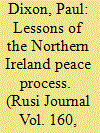

|
|
|
|
|
| Summary/Abstract |
The Northern Irish peace process has brought about a radical shift from violent conflict to relatively peaceful power-sharing between polarised political parties. Paul Dixon argues that by the mid-1980s, the war had reached a stalemate, and the Conservative and Labour governments took a ‘pragmatic realist’ approach to seeking a resolution. This involved using ‘political skills’, or deception and manipulation, to achieve an ‘honourable’ compromise with the enemy.
|
|
|
|
|
|
|
|
|
|
|
|
|
|
|
|
| 5 |
ID:
047238
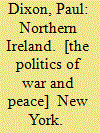

|
|
|
|
|
| Publication |
New York, Palgrave, 2001.
|
| Description |
xviii, 334p.Hbk
|
| Standard Number |
0333729684
|
|
|
|
|
|
|
|
|
|
|
|
Copies: C:1/I:0,R:0,Q:0
Circulation
| Accession# | Call# | Current Location | Status | Policy | Location |
| 044785 | 941.6/DIX 044785 | Main | On Shelf | General | |
|
|
|
|
| 6 |
ID:
057559
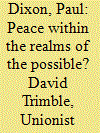

|
|
|
| 7 |
ID:
068953
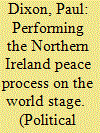

|
|
|
| 8 |
ID:
111492


|
|
|
|
|
| Publication |
2012.
|
| Summary/Abstract |
This article presents a (critical realist) constructivist critique of both consociational and civil society/transformationist approaches and their crude understandings of politics and the prospects for political change. Consociationalism's primordialist or essentialist foundation leads it towards a world-weary, pessimistic, conservative realism about how far 'divided societies' may be transformed. Advocates of the civil society approach, in contrast, take an instrumentalist view of identity and are optimistic that a radical transformation can be achieved by mobilising the people against 'hard-line' political representatives. The constructivist approach can provide a framework in which a more complex and nuanced understanding of identities is possible. This better equips us for understanding the prospects of bringing about desirable political change. The first part of this article is a critique of Nagle and Clancy's consociationalism. The second part provides a brief outline of a constructivist critique of both the consociational and civil society understandings of politics and their contribution to understanding the politics of managing conflict.
|
|
|
|
|
|
|
|
|
|
|
|
|
|
|
|
| 9 |
ID:
098471
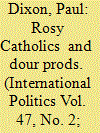

|
|
|
|
|
| Publication |
2010.
|
| Summary/Abstract |
This article challenges the orthodox, 'pan-nationalist' view of the impact of the Cold War and President Clinton's role in the Northern Ireland peace process. It is argued that this orthodox view places much faith in the 'front stage'; self-congratulatory accounts of political actors who sought to enhance their reputations through involvement in the peace process. A theatrical metaphor is deployed to 'go behind the scenes' and produce a more nuanced account of the influence of the US President. It is argued first, that the pan-nationalist charade deliberately exaggerated Clinton's role in order to demonstrate the power of 'unarmed struggle' and win over a key republican audience to the peace process. Second, the British government, to some extent, played its 'villainous' role in the pan-nationalist charade because it understood the Sinn Fein leadership's problems in bringing a united republican movement into a ceasefire. Third, the peace process was emerging well before the US President took his cue from Irish nationalist politicians to enter the political stage. Fourth, the 'pan-nationalist' view does not consider the malign impact of the US role on unionism, which underlined unionist isolation and undermined pro-Agreement unionism. Finally, it is argued that President Clinton's grasp of the 'realities' of Northern Irish politics was not firm and the President oscillated between an overoptimistic 'modernising' view of the conflict and over-pessimistic primordial - 'Rosy Catholics' and 'Dour Prods' - view neither of which accurately describes the conflict.
|
|
|
|
|
|
|
|
|
|
|
|
|
|
|
|
| 10 |
ID:
053260
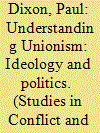

|
|
|
| 11 |
ID:
052497
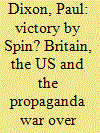

|
|
|
|
|
| Publication |
Winter 2003.
|
| Summary/Abstract |
This article considers whether NATO won the war in Kosovo by spin, tricking Milosevic into believing that a ground invasion was imminent. It argues that during the conflict over Kosovo the propaganda war for public opinion was perceived by British and US governments as vitally important. NATO elites attempted to address (at least) eleven different audiences with a message appropriate to each. The two key audiences were, first, NATO public opinion which had to be reassured of the legitimacy of NATO's war against Kosovo and was also unsettled about the prospect of deploying ground troops. Simultaneously, NATO attempted to communicate to the second audience, Milosevic and the Serb elite, a more aggressive message that it would take whatever steps were needed to prevail. Using various 'political skills' NATO escalated the propaganda war against Milosevic while attempting to pacify domestic opinion and this may well have played an important role in the capitulation of the Serb leader.
|
|
|
|
|
|
|
|
|
|
|
|
|
|
|
|